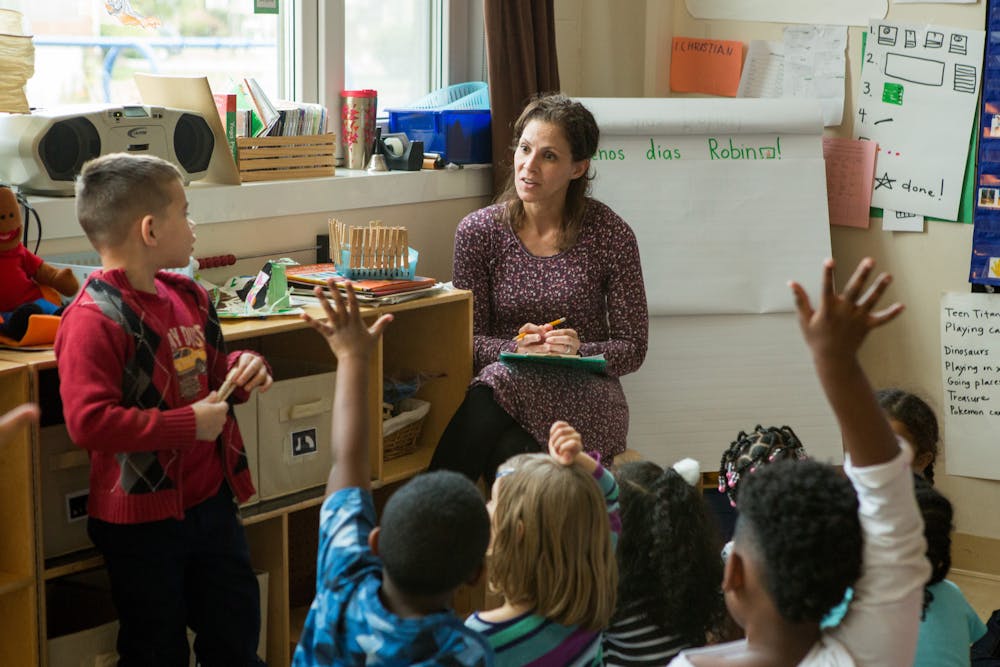It has been three years since I saw most of my high school teachers in-person. The 500-plus seniors in my class left campus in March 2020 and — aside from dropping off textbooks, attending a drive-through graduation parade or picking up our diplomas — most of us never returned.
Throughout high school, I often had conversations with my teachers about their jobs. We discussed the long hours, students’ and parents’ entitlement, pressure from administration, union negotiations, their second or third jobs. While being a teacher in America has long been referred to as a “thankless job” and experts have been concerned about the national teaching shortage for more than a decade, the COVID-19 pandemic exacerbated the problems faced by the educator workforce.
Now, more than three-quarters of U.S. states are facing a teacher shortage. As the Economic Policy Institute points out, the two biggest drivers of the shortage are inadequate pay and a taxing work environment. If the U.S. continues to burden teachers with increasing stress and decreasing salaries, we will all fall victim to the consequences.
It’s a running joke that teachers didn’t choose their profession for the money, but many may fail to realize just how bad educator salaries have become. The average teacher salary has actually decreased over the past decade; when adjusted for inflation, the typical teacher income is over $2,000 less than it was 10 years ago. Due to these financial pressures, almost one-third of new teachers have second jobs.
Worryingly, 55% of educators surveyed last February said they were considering leaving the field earlier than they had initially intended. One thing that could make them stay is better pay. Nearly 60% of teachers said a salary increase that exceeded cost-of-living increases would make them more likely to stick with their career long-term.
The teaching profession not only causes financial stress but also creates a toll on one’s mental health. K-12 educators face the highest burnout rate among all U.S. industries, including health care and community and social services. The job of an educator was stressful to begin with, but the pandemic has added new challenges to teachers’ plates, such as learning loss, more behavioral problems and higher rates of chronic absenteeism.
Additionally, when politicians battle over school curricula, teachers are caught in the crossfire. One-quarter of teachers have been told to avoid discussing politics in class and 37% have reported experiencing harassment over politicized issues such as race.
With all the hurdles teachers jump through just to earn 23.5% less than comparable college graduates, it’s easy to think teaching isn’t worth the trouble. I can’t tell you how many times I have heard a classmate say, “If money weren’t an object, I would be a teacher.” This dismissal of education as a career path isn’t surprising at a top school like Hopkins. Generally, high-achieving students don’t want to become educators. In a 2016 ACT survey, only 4% of surveyed high school graduates expressed a desire to become teachers, administrators or counselors. Those who did want to pursue education were especially weak in math and science.
Why should we care about prospective teachers’ academic achievement? Stanford researchers have found that, when teachers display greater cognitive skills, their students perform better. This link is stronger for lower-income students, particularly in reading. The researchers suggest that, by increasing teacher pay, we could attract a larger applicant pool for teaching positions and be more selective about who we hire to educate our youth.
While increasing teacher pay won’t guarantee that the smartest and most effective candidates will be hired, incentivizing high-achieving high school graduates to pursue a career in education could be a vital step on the path to improving U.S. student performance. After all, U.S. students continue to rank below many other developed countries in science, math and reading.
Yet, due to the national teaching shortage, barriers to entry into the field have decreased. Some states have waived certain requirements to become a certified educator, such as passing a general education exam. It’s understandable that states are eager to fill teaching positions. Teacher shortages decrease students’ achievement and teachers’ effectiveness, and the impact is more severe in high-poverty schools. But simply filling vacancies as they crop up isn’t a sustainable solution. Enrollment in teacher education programs is on the decline, and 44% of new teachers leave the field within five years.
Instead of scrambling to fill empty positions, states should better support teachers — financially and emotionally — in the first place. This would not only make current teachers less likely to leave the field but also entice bright high school graduates to consider a career in education. In addition to paying teachers more, which the majority of Americans already support, teachers deserve more supportive administration, better working conditions and greater autonomy.
Though it’s been a few years since I’ve seen my high school teachers, I still think about them and the lessons they imparted frequently. Teachers are some of the most impactful individuals in a child’s upbringing. It is an honorable profession, and teachers’ salaries and working conditions should reflect that.
Abigail Tuschman is a junior from Fort Lauderdale, Fla. majoring in Writing Seminars and Natural Sciences. She is the Opinions Editor for The News-Letter.





